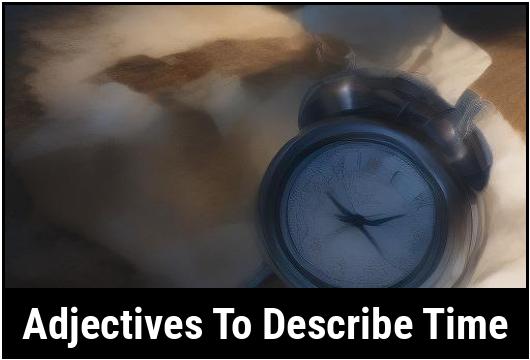- You are here:
- Home »
- adjectives
- » 31 Adjectives To Describe Time

31 Adjectives To Describe Time
Time is a concept that plays a fundamental role in our lives, and it is often described using adjectives that capture its various qualities. Adjectives are words that modify or describe nouns, and when used to describe time, they can convey a wide range of emotions, characteristics, and perspectives associated with it. In this article, we will explore the different types of adjectives used to describe time, why they are important, and how to choose the right adjective to effectively communicate the nuances of time.
Adjectives are an essential component of language that enriches our expression and communication. When it comes to time, adjectives play a crucial role in conveying the specific qualities and dimensions of different temporal experiences. From fleeting moments to enduring periods, adjectives offer a diverse palette of descriptive tools to articulate the nature of time.
Key Takeaways
- Adjectives are words used to describe or modify nouns, and when applied to time, they help to convey its various characteristics and qualities.
- Choosing the right adjective to describe time is essential for accurately communicating temporal experiences and perceptions.
- There are various types of adjectives that can be used to describe time, each serving a unique purpose in capturing different temporal dimensions and qualities.
Adjectives To Describe Time
1. Fleeting
The first adjective that comes to mind when describing time is "fleeting." It signifies the temporariness and transience of moments. Time is often perceived as passing quickly, leaving us with a sense of urgency and the need to seize the present. Embracing the fleeting nature of time can encourage us to make the most of each moment and prioritize what truly matters.
2. Eternal
On the opposite end of the spectrum, we have the adjective "eternal." While time may seem fleeting on a human scale, it can also be perceived as infinite and unending. This viewpoint highlights the vastness and grandeur of time, allowing us to reflect on the continuity and interconnectedness of all things.
3. Elusive
Time has a mysterious quality that often makes it difficult to grasp or fully comprehend. The adjective "elusive" captures this enigmatic nature, emphasizing how time can slip away from us when we’re not paying attention. It serves as a reminder to appreciate each passing moment and make the most of the time we have.
4. Relentless
In many situations, time feels like an unstoppable force that moves forward, regardless of our desires or efforts to slow it down. The adjective "relentless" encompasses this perception, conveying the continuous and persistent nature of time. It urges us to stay mindful of its passage and make conscious choices about how we spend it.
5. Precious
Often, time is seen as a limited resource that should be cherished and treasured. The adjective "precious" encapsulates the value and significance we attach to time, prompting us to use it wisely and meaningfully. When we recognize the preciousness of time, we are more likely to prioritize self-care, relationships, and pursuing our passions.
6. Arduous
Certain periods or tasks can make us feel as though time is moving more slowly than usual. The adjective "arduous" describes these moments of perceived slowness or monotony. Whether it is waiting for an important event or undertaking a challenging endeavor, time can seem to stretch, making us impatient and longing for change.
7. Transcendent
At times, our experiences may take us beyond the constraints of normal time perception. The adjective "transcendent" conveys the feeling of time appearing to expand or contract during extraordinary moments. It captures instances when we become so engrossed in an activity or experience that time seems to lose its grip on us.
8. Opportune
"Opportune" is an adjective that signifies the perfect or advantageous timing of an event or circumstance. It implies that something happens at the ideal moment, aligning with our goals or desires. Recognizing opportune moments allows us to make timely decisions and seize opportunities as they arise.
9. Momentous
Some events have such significance that they become etched in our memories forever. The adjective "momentous" describes these grand, life-changing occasions. These moments often mark milestones or turning points in our lives, shaping our future paths and leaving an indelible impact on our sense of self.
10. Chronological
When describing time in a structured and ordered manner, the adjective "chronological" comes into play. It refers to arranging events or information in the order they occurred, facilitating our understanding of the progression of time. A chronological perspective can help us draw connections and insights by examining the sequence of events.
11. Swift
Often, we experience time as a rapid and unstoppable force. The adjective "swift" captures this sensation, depicting the quick pace at which moments pass. It is an effective descriptor when attempting to depict a sense of urgency or emphasize the fast-paced nature of a particular period.
12. Endless
Similar to "eternal," the adjective "endless" portrays time as infinite, stretching out into the unknown. It suggests a lack of boundaries or limitations, encouraging us to explore and appreciate the vast expanse of time. The idea of endless time can inspire curiosity, wonder, and a desire to discover new experiences.
13. Enriching
Time has the potential to enrich our lives, expand our knowledge, and cultivate personal growth. The adjective "enriching" describes these transformative moments when we engage with activities, relationships, or opportunities that nourish our minds and souls. It reminds us to seek out experiences that bring meaning and fulfillment to our lives.
14. Fleeting
Time’s fleeting nature gives rise to the suggestion that certain moments should be treasured. The adjective "fleeting" encapsulates this transience, prompting us to appreciate each passing moment before it slips away. Recognizing the fleeting nature of time can instill gratitude and a greater sense of presence in our lives.
15. Boundless
While time is often experienced as linear and finite, it can also be portrayed as boundless, with endless possibilities and potential. The adjective "boundless" invites us to imagine a world in which time knows no constraints, inspiring creativity, innovation, and a sense of wonder for what the future may hold.
16. Transformative
Time has the power to bring about change and transformation in our lives. The adjective "transformative" signifies those moments or periods that lead to personal growth, self-discovery, or profound shifts in our perspectives. Embracing transformative experiences allows us to evolve, learn, and become more resilient.
17. Fleeting
Time’s temporality and the rapidity with which it passes warrant another mention of the adjective "fleeting." This descriptor reminds us that every second counts and encourages us to make the most of our time by fostering meaningful connections, pursuing our passions, and finding joy in even the smallest moments.
18. Infinite
Similar to "endless," the adjective "infinite" speaks to the vastness and limitless nature of time. It suggests that time extends beyond our comprehension, encompassing an eternity of possibilities. The concept of infinite time invites us to ponder our place within the grand tapestry of existence.
19. Precise
On occasion, we may find ourselves needing to pinpoint specific moments or durations in time. The adjective "precise" becomes relevant in such instances, highlighting the importance of accuracy and exactness when dealing with temporal information. Being precise allows us to effectively communicate schedules, deadlines, or historical events.
20. Nostalgic
Time can evoke a strong sense of nostalgia, reminding us of cherished memories and significant moments from our past. The adjective "nostalgic" encompasses these sentimental feelings, allowing us to reflect on past experiences and appreciate the impact they have had on shaping our identities.
21. Cyclical
While time is often portrayed as linear, the adjective "cyclical" describes its repetitive nature. It signifies the recurrence of events or patterns, highlighting the concept of cycles within larger timeframes. Recognizing the cyclical nature of time can help us anticipate patterns and understand that history often repeats itself.
22. Limitless
The adjective "limitless" alludes to the concept of time without restrictions or boundaries. It encourages us to think beyond conventional notions of finite time and to explore a realm where possibilities are boundless. By embracing the idea of limitless time, we can expand our imagination and broaden our horizons.
23. Valuable
Time is often referred to as a valuable resource because of its scarcity and importance. The adjective "valuable" emphasizes the worth and significance we attach to time. Recognizing its value motivates us to make conscious choices about how we allocate our time, ensuring that it aligns with our priorities and aspirations.
24. Momentary
The adjective "momentary" characterizes time as fleeting and passing swiftly. It underscores the idea that each moment is temporary and quickly gives way to the next. Recognizing the momentary nature of time can serve as a reminder to savor every experience and find joy in the present.
25. Recurring
Certain events or phenomena repeat consistently over time. The adjective "recurring" describes these cyclical patterns that manifest within the passage of time. Whether it is the changing of seasons or the recurrence of historical events, understanding these recurring patterns allows us to perceive a deeper sense of interconnectedness and continuity.
26. Evolving
Time is a dynamic force that continually pushes us forward, bringing forth growth, change, and progress. The adjective "evolving" captures this transformative quality, reminding us that time allows us to develop, adapt, and embrace new possibilities. Embracing an evolving perspective encourages personal and collective advancement.
27. Measured
The adjective "measured" alludes to the act of quantifying or assessing time. It refers to the process of determining durations, intervals, or precise moments. Being measured in our approach to time management enables us to allocate resources efficiently and make informed decisions about how we spend our days.
28. Impermanent
While time can evoke feelings of permanence and continuity, it also encompasses impermanence and change. The adjective "impermanent" signifies the transient and fleeting nature of moments, reminding us to appreciate the ever-shifting present while acknowledging that it will eventually give way to the next moment.
29. Persistent
Time moves forward relentlessly, ceaselessly pushing us toward the future. The adjective "persistent" describes this tenacity and perseverance embodied by time. Recognizing the persistence of time encourages resilience and a forward-thinking mindset, enabling us to adapt to life’s challenges and seize opportunities as they arise.
30. Unbounded
The adjective "unbounded" conveys a sense of freedom and liberation from the constraints of time. It suggests a world without limitations or restrictions, where time does not define our experiences. Imagining an unbounded relationship with time can inspire us to transcend conventional notions and explore the untapped potential within ourselves.
31. Gracious
Lastly, the adjective "gracious" highlights the virtue of appreciating the present moment and approaching time with gratitude and mindfulness. It implies that time has the capacity to bestow blessings and opportunities upon us. Embracing a gracious perspective allows us to cultivate a positive relationship with time, fostering joy, and contentment.
Why Use Adjectives To Describe Time
Adjectives are used to provide specific details and enrich the description of nouns. When it comes to time, adjectives play a crucial role in articulating the nuances and characteristics of different temporal experiences. By using adjectives to describe time, individuals can convey the nature, duration, quality, and emotional resonance of specific temporal moments or periods. This allows for more vivid and nuanced expression, enabling individuals to effectively communicate their experiences and perceptions related to time.
Moreover, adjectives can imbue time with emotive or qualitative dimensions that enhance the impact and resonance of written or spoken communication. Whether it’s capturing the fleeting nature of a moment, the enduring quality of a memory, or the anticipation of a future event, adjectives enable individuals to evoke specific temporal associations and emotions.
How To Choose The Right Adjective To Describe Time
Choosing the right adjective to describe time requires a consideration of the specific qualities, characteristics, and emotional resonance one aims to convey. Here are some factors to consider when selecting an adjective to describe time:
-
Context: Consider the context in which the adjective will be used. Is it in a narrative, a scientific discussion, a poetic expression, or a technical description? The context will influence the choice of adjectives to ensure they align with the overall tone and purpose of the communication.
-
Emotional Tone: Determine the emotional tone or atmosphere you want to convey. Are you aiming to evoke a sense of nostalgia, urgency, tranquility, or excitement? The emotional resonance of the adjective should align with the intended emotional impact of the description.
-
Duration and Specificity: Depending on the specific temporal experience being described, consider the duration, specificity, and intensity of the adjective. For instance, is the time frame brief or extended? Is it a general period or a precise moment?
-
Audience: Understand the audience and their potential associations with the adjectives used to describe time. Different adjectives may resonate differently with diverse audiences, and considering their perspective can enhance the effectiveness of the descriptive choices.
Types Of Adjectives For Describing Time
When it comes to describing time, various types of adjectives can be employed to effectively capture its diverse qualities and dimensions. Here are some of the key types of adjectives used to describe time:
1. Quantitative Adjectives
Quantitative adjectives are used to specify the quantity or numerical aspects of time. These adjectives provide a precise indication of the duration, frequency, or measurement associated with a particular temporal concept. Examples of quantitative adjectives for time include:
- Two-hour meeting
- Weekly occurrence
- Frequent delays
These adjectives offer a concrete and specific understanding of time, enabling individuals to communicate the temporal parameters with clarity and precision.
2. Qualitative Adjectives
Qualitative adjectives are employed to convey the subjective qualities, characteristics, or emotions associated with time. These adjectives provide a nuanced and emotive dimension to the description of temporal experiences. Examples of qualitative adjectives for time include:
- Ethereal moment
- Poignant memory
- Joyful occasion
Qualitative adjectives enrich the depiction of time by capturing its emotional resonance, subjective nature, and evocative qualities.
3. Relative Adjectives
Relative adjectives are utilized to express the position, sequence, or relationship of time in comparison to other temporal references. These adjectives enable individuals to articulate the sequential or contextual aspects of time. Examples of relative adjectives for time include:
- Upcoming event
- Previous experience
- Subsequent stage
By using relative adjectives, individuals can convey the temporal positioning and contextual relevance of specific events or periods.
4. Descriptive Adjectives
Descriptive adjectives are employed to depict the specific attributes, qualities, or characteristics of time. These adjectives offer a detailed and vivid portrayal of temporal experiences, enabling individuals to capture the sensory or perceptual aspects of time. Examples of descriptive adjectives for time include:
- Breathtaking sunset
- Endless wait
- Ephemeral glimpse
Descriptive adjectives provide a rich and detailed representation of time, allowing individuals to convey its sensory, visual, or experiential facets.
5. Absolute Adjectives
Absolute adjectives are used to convey the unchanging, inherent, or immutable characteristics of time. These adjectives offer a sense of permanence, universality, or fundamental nature associated with temporal concepts. Examples of absolute adjectives for time include:
- Infinite possibilities
- Irreversible change
- Immutable laws
Absolute adjectives establish the fundamental and unchanging aspects of time, emphasizing its enduring or foundational qualities.
6. Periodic Adjectives
Periodic adjectives are employed to characterize the recurring, cyclical, or repetitive nature of time. These adjectives capture the rhythm, repetition, or regularity inherent in various temporal phenomena. Examples of periodic adjectives for time include:
- Seasonal changes
- Cyclical patterns
- Regular intervals
Periodic adjectives highlight the cyclic or repetitive dynamics of time, enabling individuals to articulate the recurring nature of specific temporal events or processes.
Adjectives play a pivotal role in articulating the diverse qualities, characteristics, and emotional resonances of time. By using adjectives to describe time, individuals can convey the specific duration, emotional tone, relational positioning, and qualitative attributes associated with different temporal experiences. Understanding the various types of adjectives for describing time and the factors to consider when choosing the right adjective enables individuals to communicate their temporal perceptions and experiences with depth, clarity, and emotive resonance. As such, adjectives serve as essential tools for enriching and enhancing the descriptive expression of time in both written and spoken communication.
Examples Of Adjectives For Different Types Of Time
Adjectives are an integral part of the English language that allows us to describe and provide more information about nouns. While they are commonly used to describe people or objects, they can also be used to describe time. Adjectives for time help us convey more specific information about when an event occurred or will occur.
Adjectives can be used to describe time in various ways. Here are some examples of adjectives commonly used to describe different types of time:
1. Specific Time
Adjectives used to describe specific points in time are often associated with precise dates, hours, or moments. Examples include:
- Early: We arrived at the meeting early and had time to prepare.
- Late: The train is running late, so we might miss our connection.
- Midnight: We celebrated the New Year at midnight with a spectacular fireworks display.
- Noon: Let’s meet for lunch at noon.
2. Duration Of Time
When we want to describe how long an event or action lasts, we can use adjectives that express the duration of time. Some examples include:
- Brief: The meeting was brief, lasting only 15 minutes.
- Long: We had a long and exhausting journey, spanning hours.
- Extended: The concert featured an extended performance by the talented musician.
- Short: I need a short break to catch my breath.
3. Frequency
Adjectives related to frequency can be used to describe how often an event occurs. Examples include:
- Daily: She goes for a daily run to keep fit.
- Weekly: We have a weekly staff meeting every Monday.
- Monthly: The magazine publishes a monthly edition with the latest trends.
- Yearly: The company organizes a yearly conference for its employees.
4. Relative Time
Relative time adjectives are used to describe the position of an event in relation to the present, past, or future. Some examples include:
- Future: We have a future plan to expand our business to new markets.
- Past: The past decade has witnessed significant technological advancements.
- Present: He is currently in the present stage of his research project.
- Immediate: Please take immediate action to resolve the issue.
5. Time Of Day
Adjectives can also describe different parts of the day. Here are some examples:
- Morning: I enjoy a peaceful walk in the morning.
- Afternoon: Let’s meet for coffee in the late afternoon.
- Evening: We had a delightful evening filled with laughter and good company.
- Nighttime: The city skyline looks breathtaking during nighttime.
6. Order And Sequence
Adjectives related to order and sequence help describe the placement of events or objects in a chronological order. Examples include:
- First: The first day of school is always exciting and nerve-wracking.
- Last: The last chapter of the book revealed an unexpected twist.
- Next: The next step is to gather feedback from our customers.
- Previous: The previous owner of the house left behind some old furniture.
7. Geographical Time
Adjectives can also be used to describe time in a geographical or cultural context. Examples include:
- Eastern: We will have a conference call with our colleagues in the Eastern time zone.
- Western: The Western part of the country experiences a different climate.
- Lunar: The Lunar New Year is celebrated with colorful festivals in many Asian countries.
- Solar: Solar eclipses are rare and fascinating astronomical events.
These examples demonstrate how adjectives can enhance our descriptions of time, providing more depth and specificity.
Common Mistakes In Using Adjectives To Describe Time
Although adjectives can add valuable information when describing time, there are some common mistakes that people make. Here are a few to be aware of:
1. Ambiguity
One common mistake is using ambiguous adjectives that can lead to confusion about the specific time being referenced. For example, using "recent" without any further context can be unclear. Instead, specifying "recently" or "in the past month" provides a clearer description of the time frame.
2. Incorrect Tense
Another mistake is using adjectives with incorrect verb tenses. For example, using "lasted" instead of "lasting" when describing the duration of time can create grammatical errors. It is essential to match the adjective tense with the verb tense for proper sentence construction.
3. Overgeneralization
Sometimes people use adjectives that are too general and fail to provide enough detail about the time being described. For example, saying "a long time ago" without specifying the exact timeframe can be vague. Adding more specific information like "in the 19th century" or "during the summer of 2005" adds clarity and specificity.
4. Lack Of Context
When using adjectives to describe time, it is crucial to provide sufficient context for the reader or listener to understand the intended meaning. Without proper context, the adjective may not convey the desired information. For instance, saying "early morning" may have a different interpretation depending on whether it refers to 5 am or 8 am.
Using Adjectives Effectively
To use adjectives effectively when describing time, consider the following tips:
1. Be Precise
Using precise adjectives helps convey accurate information about time. Instead of saying "a few weeks ago," specify the exact timeframe such as "three weeks ago." This precision adds clarity and makes your description more informative.
2. Use A Mix Of Adjectives
Instead of relying solely on one type of adjective to describe time, try using a mix of different adjectives. This variety adds depth and richness to your descriptions. For example, instead of always using "daily," you can use "weekly," "monthly," or "yearly" to provide a more diverse view of time.
3. Consider Context
When using adjectives to describe time, consider the context in which your description will be understood. If you are communicating with someone from a different time zone, ensure that your adjectives are clear and easily interpretable in their frame of reference. Additionally, be aware of cultural or regional differences that may influence the interpretation of certain adjectives related to time.
4. Clarify Vague Adjectives
If you find yourself using vague adjectives, take a moment to clarify and add more specificity to your description. This will help ensure that your intended meaning is conveyed accurately. For example, instead of saying "late morning," you can specify "11 am" to eliminate any ambiguity.
5. Proofread And Revise
After using adjectives to describe time, take the time to proofread your writing and revise if necessary. Pay attention to the clarity and coherence of your descriptions, eliminating any confusion or inconsistencies. This extra step will ensure that your use of adjectives enhances your communication and provides accurate information about time.
Exercises And Practice
To reinforce your understanding of adjectives used to describe time, here are some exercises and practice activities:
-
Write a short paragraph describing a recent vacation, incorporating different adjectives to describe specific points in time, duration, and frequency.
-
Create a dialogue between two characters discussing an event that occurred in the past. Use adjectives to convey the relative time and order in which the events took place.
-
Rewrite the following sentences, correcting any mistakes in the use of adjectives related to time:
a. The party lasted for briefly.
b. I wake up every day at the morning.
c. We are meeting in the immediate week to discuss the project.
d. The concert will take place at five o’clock late evening.
-
Watch a movie or read a book and pay attention to the adjectives used to describe time throughout the narrative. Take notes and analyze how these adjectives contribute to the overall storytelling.
Conclusion
Adjectives play a significant role in enhancing our descriptions of time. By incorporating adjectives related to specific time points, duration, frequency, relative time, time of day, order, and geographical time, we can provide a more comprehensive and detailed account of when events occur. However, it is crucial to avoid common mistakes such as ambiguity, incorrect verb tenses, overgeneralization, and lack of context. By following the tips mentioned in this article and practicing with exercises, you will develop the skills needed to use adjectives effectively and create richer descriptions of time.
FAQS On Adjectives To Describe Time
What Is The Importance Of Using Adjectives To Describe Time?
Using adjectives to describe time can add depth and specificity to your language, allowing for a more vivid and accurate depiction of time in your writing.
How Do Adjectives Contribute To Describing Time?
Adjectives can add descriptive details to words that indicate time, such as "speedy" for quick, "languid" for slow, or "eternal" for endless.
Can You Give Examples Of Adjectives Commonly Used To Describe Time?
Sure, some examples include "fleeting," "endless," "precious," "momentous," and "transient." These adjectives can help convey different emotions or perspectives on the passing of time.
Are All Adjectives Used To Describe Time Created Equal?
No, some adjectives may have positive or negative connotations, while others may be neutral. It’s important to choose adjectives that accurately reflect the tone and message you want to convey about time.
How Can Using Adjectives To Describe Time Improve My Writing?
By incorporating adjectives to describe time, you can create a more dynamic and sensory experience for your reader, making your writing more engaging and impactful. It also allows for a more specific and nuanced portrayal of time in your story or essay.








